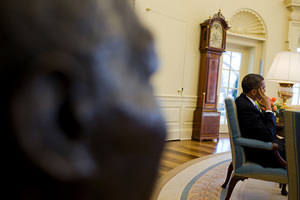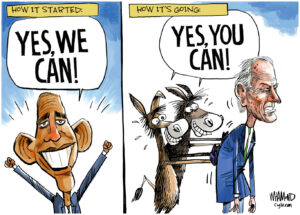The Invisible Ward 8
Entrenched black poverty, with all its causes and implications, barely makes a ripple in the public debate these days.
After President Barack Obama and his family attended Easter services in the poorest, blackest, most crime-ridden quadrant of Washington, his 22-car motorcade sped back across the Anacostia River to the picture-postcard, cherry-blossomy part of town. Left behind was a heartbreaking crime scene — along with tens of thousands of people who have become as invisible as ghosts.
It is rare these days when two high-profile events, within a single week, train the spotlight even briefly on the too-large segment of the African-American population that remains mired in desperate poverty and self-sustaining dysfunction. The second event was the first family’s visit to Allen Chapel AME Church for a joyous, high-spirited Easter celebration. The pastor, the Rev. Michael Bell, described it as “a monumental moment for us as a community.”
The first event took place at twilight on March 30. Gunmen in a minivan driven by a 14-year-old boy pulled up in front of a decrepit little apartment building, a popular hangout for neighborhood teenagers, and fired indiscriminately into the crowd with handguns and an AK-47-style assault rifle. Four young people were killed and five others wounded. It was the most stunning outburst of senseless violence Washington had seen in years.
Police say the apparent motive involves a complicated back story. I’ll note just two details: Many in the targeted crowd had just returned from the funeral of a 20-year-old man who had been gunned down a week earlier. And both incidents — five deaths in all — seem to have been triggered by the apparent theft of a single cheap, gold-tone man’s bracelet.
The carnage has been front-page, top-of-the-newscast fare. It is as if a veil has been lifted and the city can now see the devastation that should have been evident all along. Ward 8, the jurisdiction that includes both the church Obama attended and the site of the mass shooting, has an unemployment rate of 28.5 percent and a poverty rate of 40 percent. It has the highest percentage of single-parent households in the city, its public schools are perennially troubled and its streets are host to frequent turf battles among violent gangs.
But soon, all that will be forgotten — just as the same kind of despair goes unremembered in similar neighborhoods in Atlanta, Detroit, Baltimore, Philadelphia and every other major American city. Entrenched black poverty, with all its causes and implications, barely makes a ripple in the public debate these days.
One major reason, perhaps the major reason, is that crime rates have fallen sharply over the past two decades throughout the country. In 1990 there were 472 homicides in Washington; last year there were just 143, and this year’s murder rate is even lower. The sight of a group of black teenagers downtown doesn’t automatically provoke fear in others the way it once did, which is a good thing. But it’s not good that people who live in more affluent neighborhoods, or in the suburbs, now seem to believe they don’t have to notice those teenagers at all. People look right through them.
The violent crime that remains has largely been corralled into the impoverished neighborhoods where both perpetrators and victims live. Governments, nonprofits, churches and other institutions do what they can, but their efforts do not begin to approach the scale of the problem. What’s needed is massive intervention on every front. It would be a great accomplishment, for example, to really fix the schools. But what good are state-of-the-art facilities and qualified, motivated teachers when the students arrive damaged by dysfunctional families and a toxic peer-group culture — and when there are no jobs waiting for them when they leave?
One of the shooting victims, 16-year-old Brishell Jones, wanted to become a chef. She just happened to go out Tuesday night, and never made it home.
Before he entered politics, Obama worked in equally desperate communities in Chicago. He has the understanding, and the power, to begin the process of healing places like Ward 8. But he is going to need the political will — and the clout — to implement policies that specifically target the African-American underclass. I hate that word, underclass, and almost never use it. But the ultimate defeat that it implies seems alarmingly near.
On Monday, at the corner where nine people were shot, there were teddy bears, flowers, condolence notes, a collection of liquor bottles beneath a “no loitering” sign. Soon, the impromptu memorial will fade away. The neighborhood and its people will be invisible once more.
Eugene Robinson’s e-mail address is eugenerobinson(at)washpost.com.
© 2010, Washington Post Writers Group
Your support matters…Independent journalism is under threat and overshadowed by heavily funded mainstream media.
You can help level the playing field. Become a member.
Your tax-deductible contribution keeps us digging beneath the headlines to give you thought-provoking, investigative reporting and analysis that unearths what's really happening- without compromise.
Give today to support our courageous, independent journalists.






You need to be a supporter to comment.
There are currently no responses to this article.
Be the first to respond.